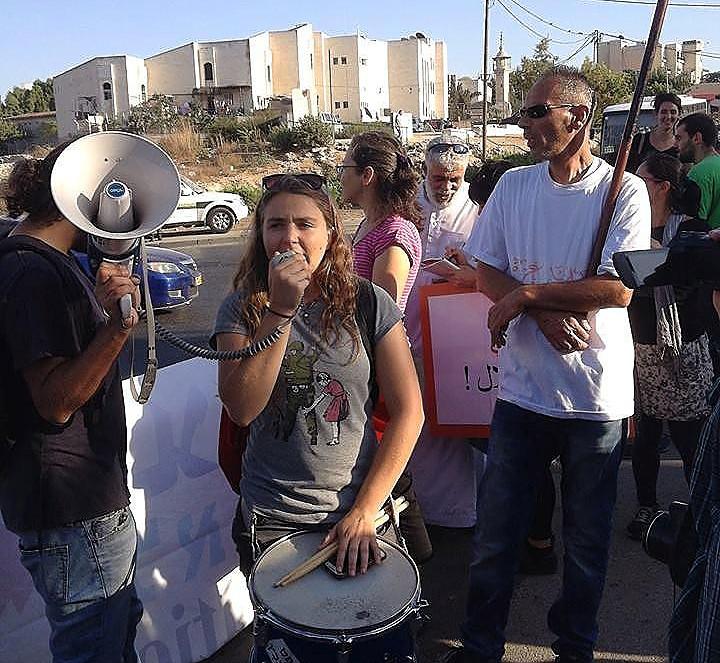- March 20, 2018
- 9 mins story

My name is Sahar Vardi. I'm a Jewish-Israeli activist from Jerusalem.
Jerusalem is a lot of things to a lot of people. For me it was the city that taught me to be an activist - a term that sounds more natural to my ears than human rights defender. Growing up in a city that 38% of its residents - Palestinians - do not even have citizenship and live in a completely different reality than their Jewish neighbours, that's what politicised me.
As a teenager, while busses were blowing up in West Jerusalem - the side of the city I grew up in - I first had a chance to go to an East Jerusalem village. A small village a 15 minute drive from my home, the residents of which weren't even residents of the city: according to Israeli law, while the village was in Jerusalem, its residents were not considered residents of the city, and therefor illegal inhabitants of their own homes. I remember my father getting phone calls in the middle of the night from people from the village that were taken out of their beds at 3am by the police, arrested for being illegally inhabitants, taken to the closest checkpoint, made to sign a statement that they won't do it again, and released with no way to get back to the home that they aren't allowed to be in anyway. And so there was a need for an Israeli activist to come and "smuggle" them back into the city, back to their homes, until the next night. For me, seeing these two completely different realities, sets of laws and daily experiences of people according to whom they were born to - that's what made me an activist.
Story Chapters
-
2. What is the most challenging part of your human rights engagement? What inspires you in this work?00:00The most challenging part of me is seeing how little our action accomplish. In the 14 years that I have been active, I have seen Israeli society around me becoming more and more right wing, less and less willing to listen to any criticism of the occupation, and less and less apologetic about its racism or anti-democratic sentiments. It seems that every week a new piece of legislation is introduces to limit the work of anything considered "left", or another discriminatory practice against Palestinian citizens of Israel, or another wave of demolitions or arrests in the occupied Palestinian territories. There's always something, and it feels like it's getting worse and worse. The realities of occupation and complete disregard of Palestinians life is getting worse, and the marginalisation and persecution of those human right defenders struggling against it are getting worse.It is one thing for the risks to grow as you feel your work gains traction, but a different thing to see the risk grow and at the same time things on the ground becoming worse, the political prospects becoming worse, and a general feeling that society around you is no longer even willing to listen to you. For me this is the hardest thing.The other side of the same coin, is that what inspires me are the people most at risk by these policies continuing to struggle including when facing prison terms or worse. Palestinians who anyway would be as risk on a daily basis by the occupation taking upon themselves an extra risk to protect others, and their own community - that for me is inspiring.
-
3. How does your human rights work affect your personal life? (For instance your relationship with family/friends.)00:00Five years ago, I was sitting for dinner with my then 12 year old little sister with a group of relative strangers - we were in the middle of a week long trip, with a few more days to spend with them. I was 22 at the time, and one of the people asked me, as is custom in Israeli society to ask people around that age, "what did you do in the military". I refused my military service and spent 5 months between military prison and detention. When this man asked the question he meant nothing by it, just making small talk, but I saw the look on my sister's face, the look that says: "It's not that I don't agree with you politically or something, but do we really have to have this conversation? do we now have to be the odd one's out, that traitors?". I would say that that is the strongest effect - becoming the other, the stranger, the traitor in your own society. When every small talk conversation becomes a political argument because who I am, what they believe I represent, threatens something in the structure of society itself. It is always being labelled, judged, being a decedent, an automatic outcast. I can add to that prison time for refusing, or arrests, or indictments, or my fears about the prospects of getting a job as a teacher once I finish my studies in a country that constantly cracks down on teachers who dare stray from the party line. But all of these are nothing in comparison to what it is to live under occupation.


